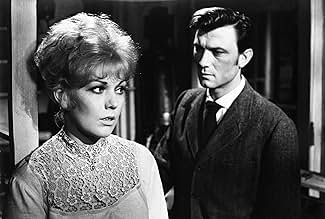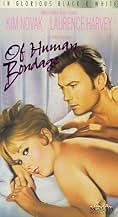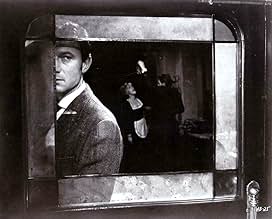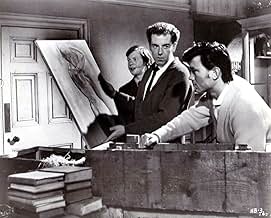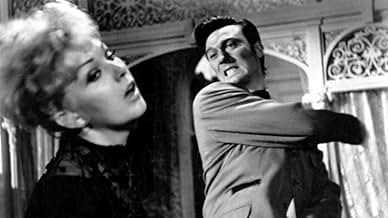NOTE IMDb
6,5/10
1,2 k
MA NOTE
Philipp, un étudiant en médecine tombe amoureux de Mildred, une serveuse. Une passion dont bientôt il n'arrive pas à se défaire.Philipp, un étudiant en médecine tombe amoureux de Mildred, une serveuse. Une passion dont bientôt il n'arrive pas à se défaire.Philipp, un étudiant en médecine tombe amoureux de Mildred, une serveuse. Une passion dont bientôt il n'arrive pas à se défaire.
- Réalisation
- Scénario
- Casting principal
- Nomination aux 1 BAFTA Award
- 2 nominations au total
Anthony Booth
- Martin
- (non crédité)
Terry Clinton
- Barmaid
- (non crédité)
May Cluskey
- Sister
- (non crédité)
Martin Crosbie
- Lab Technician
- (non crédité)
Alex Dignam
- Student
- (non crédité)
Michael Doolan
- Boy With Club Foot
- (non crédité)
Bryan Forbes
- Medical Student
- (non crédité)
Avis à la une
I read the book many years ago and it has remained one of my favorite novels. For many years since I read the book, whenever the film was shown on television, it was always the 1934 version with Bette Davis. Don't get me wrong, Bette Davis was a great actress, but for me she failed to come across as the writer Somerset Maugham had intended Mildred to be. The first time I caught the Davis version, I could only watch a few minutes of it before I gave up and could watch no longer, lest it ruin the impression of Mildred the book provided for me. Finally after many years of waiting, I caught the 1964 version and I wasn't disappointed. Someone on the message board mentioned that Somerset Maugham was most pleased with the way Kim Novak played the role and I could understand why. Immediately when I began watching Kim Novak, I was transfixed by her and felt that I had at last found Mildred as the writer intended her to be - not some shrill shrew, but an emotionally damaged beauty, still a child that had somehow made it to adulthood. It was easy to see how Philip, played perfectly by Laurence Harvey could have fallen in love with her - vulnerable, lovable, innocent, unsophisticated, always forgiving yet at the same time mean, selfish hateful, irresponsible, helpless, ignorant and vindictive. Aren't those the same characteristics we find in children? Some might question describing Mildred as innocent. Because of her promiscuous flirtatious nature, some might understandably dismiss her as a whore as Philip's best friend Griffiss continually tries to remind him. But this film is set in England of the Victorian era and some allowances can be made for that. And with Novak's great acting skills we see that Mildred was very complicated and we can't easily condemn her on the basis of her sexual misbehavior. This is what makes Novak's adaptation so appealing, that she can take this role and actually make us empathize with Mildred, if not actually see ourselves, like Philip, falling into the abyss by falling in love with her ourselves. This is what Kim Novak succeeded in doing and Bette Davis never even attempted. Bette Davis never developed the character to the degree that Novak did where we could see if she could pull it off. We could never feel much for the character Davis portrayed, but we could with Novak's - in spite of those same flaws that each of the actresses had to work with in the character of Mildred. Philip did in this saga come across other women with the best of qualities, and without those flaws found in Mildred though certainly not her beauty. But it was Mildred that would always be his great love -whether it destroyed him, as it nearly does, or finally her, as it does in the end. Only by her death could he ever escape the hold she had upon him. Kim Novak captured Mildred perfectly. Don't be put off by the IMDb's low rating for this movie relative to the Davis version. Read the book and you'll see right away that this was Mildred as the writer intended.
This film was set in Victorian England and it was perfectly suited for black and white format. It would have made as much sense to have made this movie in color as to have made the movie The Elephant Man in color. By using black and white, the film had the look and quality of that same movie, also set in Victorian England. Indeed, the story lines were similar in a sense - one of a good and gentle man trapped in a hideously deformed body that ultimately kills him. And in this, we have a cripple, and as Mildred herself often refers to him, a gentleman, who is also trapped, but unlike John Merek of the Elephant Man, in a relationship from hell that nearly destroys him as well. Philip as he confides to a friend when asked to describe his relationship with the now dead Mildred: "It is like a disease has burned through me. But not like one that one can see." Some might see parallels between the Elephant Man and Philip Carey. They are there.
Particularly sad to watch was the end of this movie. People sometimes note movies for their tear jerker quality - movies like Madam X, Imitation of Life, The Elephant Man and others. But this movie, because of the ending especially should be rated up there with any of those. In this movie, trains and train stations figured prominently in the most happiest of times in the relationship between Philip and Mildred. The final scene where Mildred is being lowered into her grave, a train passes, on a berm above this sad scene, probably the same train they had once ridden together happily in life and in love. The train seems to be saying good bye to her as we hear the rumble of train across the tracks and the mournful cry of the train's whistle. This happens as Philip turns his back on her for the last time to walk from her and to his new love waiting just outside the wrought iron gate of the cemetery. We can't but wonder if this new love he has found can ever release him from the grip that Mildred, if only her memory must still have upon him. This scene can't help but be emotionally emotionally wrenching for anyone who sees it. This is a great movie and a great credit to a great novel by Somerset Maugham and a great actress, Kim Novak who made it come alive for me. This film belongs way up there among the IMDb's 250 best movies of all time.
This film was set in Victorian England and it was perfectly suited for black and white format. It would have made as much sense to have made this movie in color as to have made the movie The Elephant Man in color. By using black and white, the film had the look and quality of that same movie, also set in Victorian England. Indeed, the story lines were similar in a sense - one of a good and gentle man trapped in a hideously deformed body that ultimately kills him. And in this, we have a cripple, and as Mildred herself often refers to him, a gentleman, who is also trapped, but unlike John Merek of the Elephant Man, in a relationship from hell that nearly destroys him as well. Philip as he confides to a friend when asked to describe his relationship with the now dead Mildred: "It is like a disease has burned through me. But not like one that one can see." Some might see parallels between the Elephant Man and Philip Carey. They are there.
Particularly sad to watch was the end of this movie. People sometimes note movies for their tear jerker quality - movies like Madam X, Imitation of Life, The Elephant Man and others. But this movie, because of the ending especially should be rated up there with any of those. In this movie, trains and train stations figured prominently in the most happiest of times in the relationship between Philip and Mildred. The final scene where Mildred is being lowered into her grave, a train passes, on a berm above this sad scene, probably the same train they had once ridden together happily in life and in love. The train seems to be saying good bye to her as we hear the rumble of train across the tracks and the mournful cry of the train's whistle. This happens as Philip turns his back on her for the last time to walk from her and to his new love waiting just outside the wrought iron gate of the cemetery. We can't but wonder if this new love he has found can ever release him from the grip that Mildred, if only her memory must still have upon him. This scene can't help but be emotionally emotionally wrenching for anyone who sees it. This is a great movie and a great credit to a great novel by Somerset Maugham and a great actress, Kim Novak who made it come alive for me. This film belongs way up there among the IMDb's 250 best movies of all time.
Not-bad third version of W. Somerset Maugham's depressing story about a sluttish waitress in London and the sensitive future doctor who becomes obsessed with her. Ravaged by critics upon its release (and thought bannable for a time for Kim Novak's suggestive scenes), this remake isn't a classic, nor does it improve on the Bette Davis version, but it does have something. Novak is just fine; Laurence Harvey also good as the smitten medico. The biggest problem is the screenplay's faithfulness to Maugham's plot, which by 1964 standards was pretty creaky. Why couldn't they have updated it just a bit? For all the talk about this version being "too shocking", the movie disappoints by not shocking at all, by playing it too safe. A soap opera, to be sure, though a handsome and interesting one. Novak-diehards will love the film, and her. **1/2 from ****
In Paris, the clubfooted aspirant painter Philip Carey (Laurence Harvey) is advised by an acquaintance to give-up his artistic ambition since he would be a mediocre artist. Philip joins the medical school in London using his inheritance to pay schooling and to have a simple but comfortable life.
When he meets the waitress Mildred Rogers (Kim Novak) in a restaurant, the shy Philip has a crush on her but she rejects him. Philip stalks Mildred and dates her; however the easy woman scorns him. When Philip proposes Mildred, she tells him that she is going to marry her lover Mille, leaving the brokenhearted Philip obsessed for her. He tries to move on, dating the intellectual Norah Nesbitt (Siobhan McKenna) in an unrequited love. However, when Mildred returns alone and pregnant, Philip lodges her at home.
Sooner Mildred becomes lover of Philip's best friend Griffiths (Jack Hedley) and leaves Philip again. When Philip finds Mildred prostituting on the red light district, he brings Mildred and her baby to live with him. Mildred unsuccessfully tries to seduce Philip but he loathes her. Mildred feels humiliated and wrecks his apartment, and Philip quits the medical school. Meanwhile Philip befriends Thorpe Athelny (Roger Livesey) that introduces his daughter Sally Athelny (Nanette Newman) to him. But Philip is still haunted by his passion for Mildred.
"Of Human Bondage" is an unpleasant romance about unrequited love, betrayal and sexual obsession. I have never read the W. Somerset Maugham's novel but John Cromwell's version of 1934 is better than this 1964 version, with a better development of the whole romance. This 1964 version reduces the whole story to an unrequited romance between Philip Carey and Mildred Rogers and does not emphasize important aspects of the romance. But Kim Novak shines with her beauty and performance, and it is easy to understand why Philip Carey falls in love with Mildred. My vote is six.
Title (Brazil): "Servidão Humana " ("Of Human Bondage")
When he meets the waitress Mildred Rogers (Kim Novak) in a restaurant, the shy Philip has a crush on her but she rejects him. Philip stalks Mildred and dates her; however the easy woman scorns him. When Philip proposes Mildred, she tells him that she is going to marry her lover Mille, leaving the brokenhearted Philip obsessed for her. He tries to move on, dating the intellectual Norah Nesbitt (Siobhan McKenna) in an unrequited love. However, when Mildred returns alone and pregnant, Philip lodges her at home.
Sooner Mildred becomes lover of Philip's best friend Griffiths (Jack Hedley) and leaves Philip again. When Philip finds Mildred prostituting on the red light district, he brings Mildred and her baby to live with him. Mildred unsuccessfully tries to seduce Philip but he loathes her. Mildred feels humiliated and wrecks his apartment, and Philip quits the medical school. Meanwhile Philip befriends Thorpe Athelny (Roger Livesey) that introduces his daughter Sally Athelny (Nanette Newman) to him. But Philip is still haunted by his passion for Mildred.
"Of Human Bondage" is an unpleasant romance about unrequited love, betrayal and sexual obsession. I have never read the W. Somerset Maugham's novel but John Cromwell's version of 1934 is better than this 1964 version, with a better development of the whole romance. This 1964 version reduces the whole story to an unrequited romance between Philip Carey and Mildred Rogers and does not emphasize important aspects of the romance. But Kim Novak shines with her beauty and performance, and it is easy to understand why Philip Carey falls in love with Mildred. My vote is six.
Title (Brazil): "Servidão Humana " ("Of Human Bondage")
Kim Novak after leaving her long term contract at Columbia made "Boys Night Out" at MGM and then this fine version of the great classic novel. MGM filmed "Of Human Bondage" on location in Ireland first billed over British star Laurence Harvey assigning Henry Hathaway,a very well known but gruff, 'shoot em up' Western Director, to helm this film. Hathaway and Novak clashed from the beginning of the filming and Kim Novak walked off the film. MGM had to decide who was more important and soon Kim Novaki was back on the film but a new director assigned. This film had a lot of bad press during the filming due to the Novak-Hathaway feud, but seen today it is a very fine film with Kim Novak superb in the role of Mildred that made Bette Davis a superstar worldwide. In fact I feel Kim Novak is better in this role than Bette Davis was, less shrill, and Ms.Novak is particularly moving in the End of the film. Kim Novak was always regarded as a big box office star, but her work in review demands a more intelligent appraisal of her varied work from "Picnic" thru "Vertigo" to "Middle Of the Night," "Strangers When We Meet" this film and another film bashed when it debuted "Kiss Me Stupid". Walter Matthau before he died gave an Interview where he stated he learned more from Kim Novak than any other person in Hollywood on screen acting.
As others have likewise commented, it is unfortunate this version will inevitably be compared to the 1934 film, but I think it stands up very well on its own. I'm not a great fan of either Novak or Harvey and I was astonished at their performances. Novak was surprisingly good, with a fresh interpretation of Mildred the slut. She captured her kind side unlike Bette Davis who seemed all bad, all of the time. Harvey also surprised me with his take on the sensitive Philip. There is one scene that is etched in my mind: after sex Mildred has just told Philip that she is getting married and as Philip pulls away the camera focuses on Mildred's profile on the pillow. Her eyes capture her essence better than any other scene. She is simultaneously calculating, bitchy and concerned. Watch for it, it's worth a second look.
Le saviez-vous
- AnecdotesThis was something of a catastrophe for MGM. Filming began early in 1963, but Henry Hathaway resigned as director and Bryan Forbes, who had a prominent supporting role, did a week of directing before also leaving the film. He tried without success to have his credit as writer of the screenplay removed and was replaced as an actor by Jack Hedley. (However, Forbes can be glimpsed, more or less as an extra, in one or two scenes.) Ken Hughes finished the film and reportedly had a very bad time; the film was many months in the editing rooms and was not seen until late in 1964, nearly a year after its scheduled release date. It ran for only 99 minutes - a surprise, as the novel is about 800 pages. It was a commercial and critical disaster, being released in the UK on the lower half of a double-bill. It has only infrequently been seen since, even on TV.
- Citations
Nora Nesbitt: You're well out of it.
Philip Carey: Out of what?
Nora Nesbitt: Whatever you came here to forget.
- ConnexionsFeatured in Hollywood and the Stars: In Search of Kim Novak (1964)
Meilleurs choix
Connectez-vous pour évaluer et suivre la liste de favoris afin de recevoir des recommandations personnalisées
Détails
- Date de sortie
- Pays d’origine
- Langue
- Aussi connu sous le nom de
- W. Somerset Maugham's of Human Bondage
- Lieux de tournage
- Société de production
- Voir plus de crédits d'entreprise sur IMDbPro
Box-office
- Montant brut aux États-Unis et au Canada
- 3 815 000 $US
- Durée1 heure 40 minutes
- Couleur
- Rapport de forme
- 1.85 : 1
Contribuer à cette page
Suggérer une modification ou ajouter du contenu manquant

Lacune principale
By what name was L'ange pervers (1964) officially released in India in English?
Répondre

